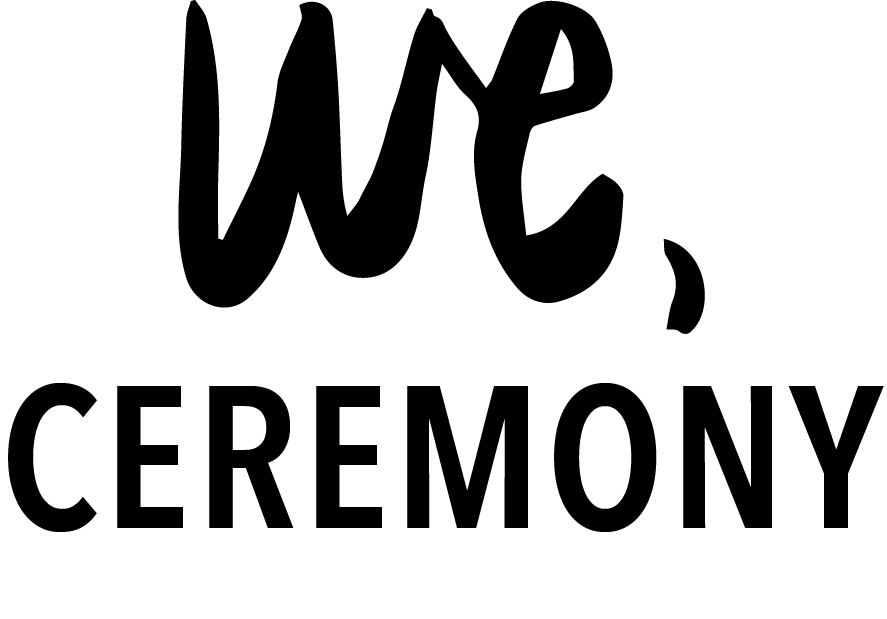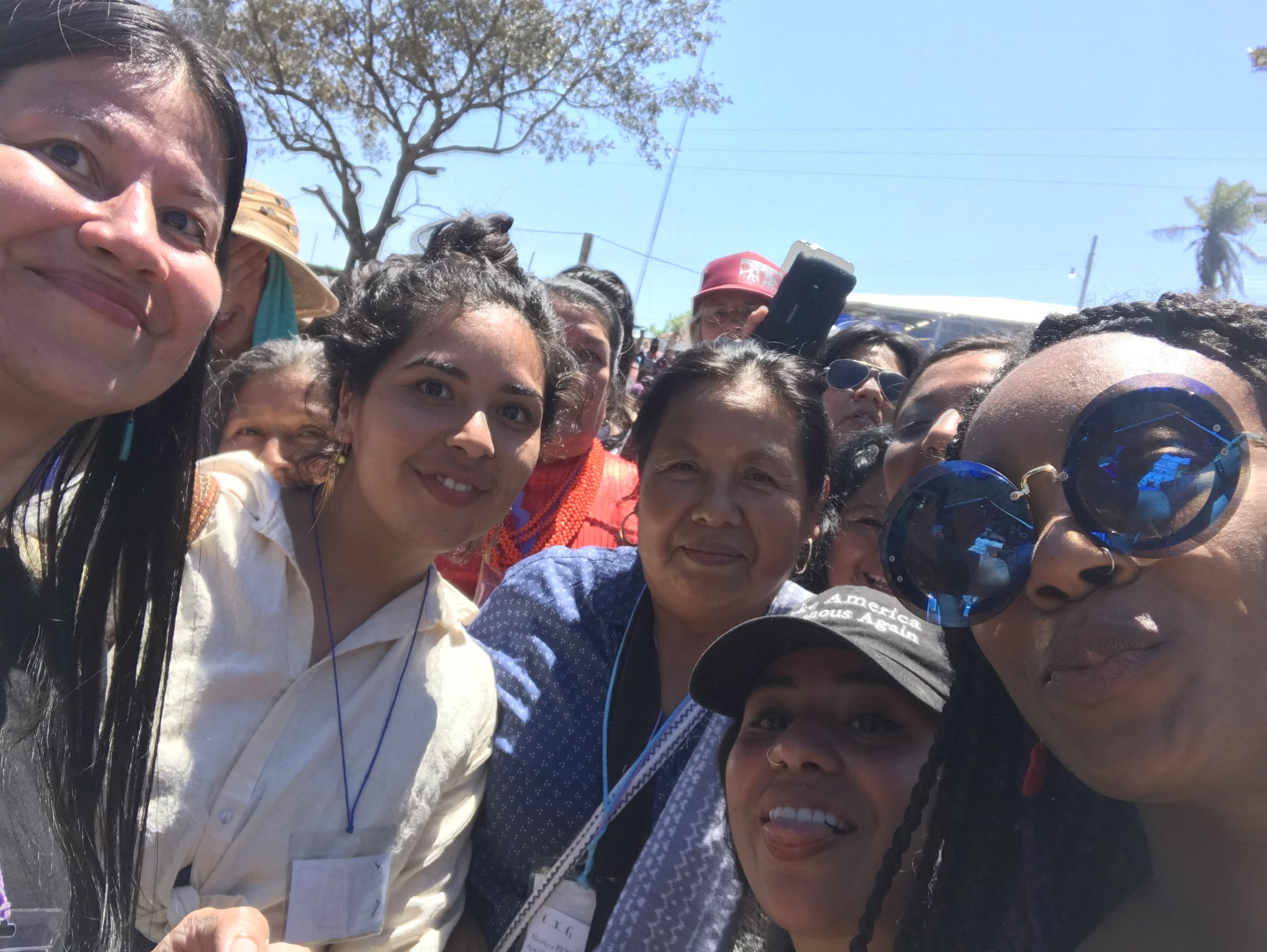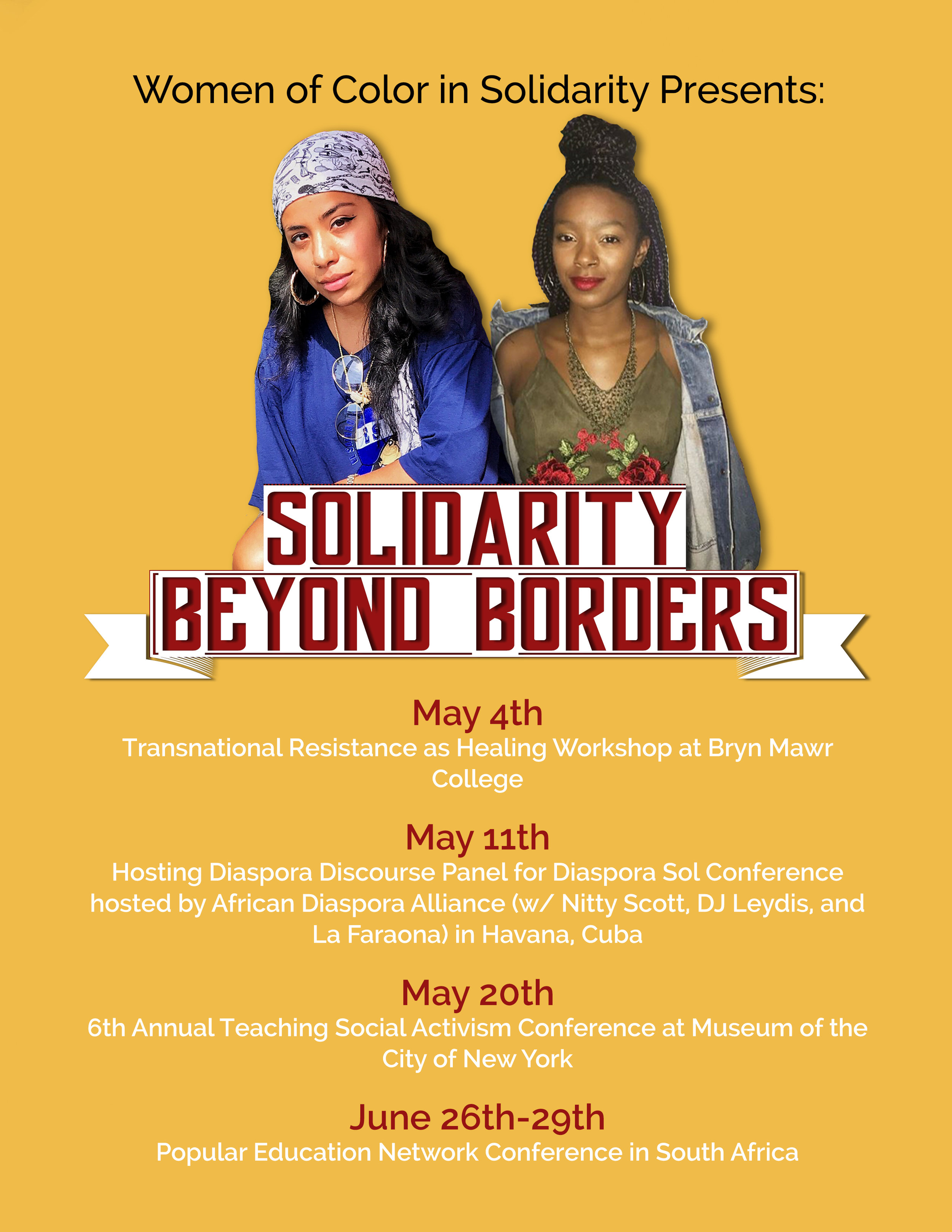Cheyenne & Florcy
Founders of Women of color in solidarity
Cheyenne Wyzzard-Jones & Florcy Romero
Cheyenne Wyzzard-Jones and Florcy Romero founded Women of Color in Solidarity to create a network of womxn of color working to help, protect, and liberate Black and brown lives, not just within the United States, but globally. While the network continues to grow larger with a highly successful conference under its belt, Women of Color in Solidarity maintains authenticity and exudes a sense of closeness. That genuineness comes through from the hard work and charisma of its founders. While Jones and Romero look to tackle issues locally and globally, it's their expression and manifestation of sisterhood that makes the missions more possible. This idea, combined with their sense of urgency, makes for effective methods in reaching their goals, from conferences to grassroots gatherings. Undoubtedly, the strength of Women in Color in Solidarity is rooted in the power and realness emanating from Jones and Romero.
for people who are not familiar with womxn of color in solidarity, tell us how you started and what your platform aims to accomplish.
Photo courtesy of Women of Color in Solidarity
Women of Color in Solidarity was founded in 2015 in Worcester, MA by Cheyenne Wyzzard-Jones and Florcy Romero during the rise of the Black Lives Matter Movement, after the killing of Michael Brown. We realized that there was a difference in not only the energy but the engagement of womxn of color - mainly Black womxn, and the white people at the protests. The white students at Clark took this as an opportunity to skip class, smoke cigarettes and clappin like it was a parade. We peeped that the womxn of color - mostly Black womxn were in the back draggin their feet to yet again, another killing of a Black child. This protest was only confined to the gated community of Clark University. It wasn’t until Florcy got on the mic and cursed people out to tell them that this incident was also happening in the hood that Clark University was located in - Main street (Worcester, MA). The protests led out the gates and we joined other community members. Again, there was an overwhelming presence of white folks there for the wrong reasons and that’s when Cheyenne got on the mic and demanded that all womxn of color link us to begin to organize amongst ourselves. This meet-up was backed by about 60 womxn of color - the youngest being 7 and the oldest being 80.
Women of Color in Solidarity is a collective that was founded to intentionally include womxn/femmes/genderfluid people of color in the required action and solidarity needed in order to protect Black and brown lives globally. We felt it was important to increase awareness about the nuances in conversation and organizing that takes place once we center the differences in access, privilege, and histories within/amongst/between our own communities.
Women of Color in Solidarity is an organization that does not believe in a single-issue problem model for social justice. We are an organization that uses educational workshops, media platforms, conferences, and grassroots gatherings to inform, learn, and practice community building with various womxn/femmes/and genderfluid people of color.
We are a collective of radical educators, healers/brujas, mothers, hood femmes, organizers, and connectors who are dedicated to building various blueprints of community based liberation throughout the world. We go where we are invited to help build.
like we, ceremony, women of color in solidarity was founded by two young womxn of color friends. please share with us a little bit about yourselves.
Florcy (left) and Cheyenne (right). Photo courtesy of Women of Color in Solidarity.
Cheyenne: WHO IS ME LMFAO Okay let me try a little something lol
Cheyenne is an Afro-Caribbean/ African American, queer, able-bodied person living in this world. She is a part of many communities that represent different versions of home for her. She is a radical educator, using education as her practice towards freedom. Honestly, Cheyenne is just trying to live, love, and decolonize these systems for the next generation to live in a better world.
Florcy: Tbh it changes constantly. I’m always gettin' to know new parts of myself. One thing that hasn’t changed tho is that I’m queer af, hood af, indigenous af, brown af, and passionate af. I am also an educator amongst a whole bunch of other things.
what are some of your favorite moments from your work with women of color in solidarity?
Honestly the dope ass people we meet is always my favorite thing. The more you interact with various communities both inside and outside of these colonial ass borders you find that people are literally interconnected by way of just knowing each other. Makes you center the knowing that you are not doing this work alone.
aside from creating space where womxn of color can heal and elevate their voices around intersectional struggles, you both are heavily involved in your communities as organizers, healers, and community educators. how do you keep yourselves grounded while working to liberate black and brown lives?
Cheyenne: Like Florcy, I am also an air sign (Libra Gang) so it becomes pivotal in both our work and individually to consistently remember to find our various sources of grounding. For me that looks like being around older Black womxn, dancing to some Soca/Reggae/and at times Gospel music, intaking sacred herbal medicines, tarot readings, moon reflections, and intentional quiet times. I think we are in a time where we are learning that grounding work is a part of The Work. It is all interconnected.
Florcy: Grounding is really hard for me in general for many reasons but esp as someone who is always in the air (but actually tho because I’m an Aquarius). I think what keeps me grounded is pachamama and ceremony. Ceremony has especially helped me reconnect and ground myself with purpose through sacred medicine, sweat lodge, danza, etc. Holding space with elders always grounds me and reminds me that we are still here and we are being guided by elements of the past that are pushing forward to this realm so that we can continue doing this work. Also no bs Hennessy and thottin n boppin with my homegirls as well lol #duality
intersectionality, disrupting whiteness, working collaboratively across communities, and healing are common themes that are at the core of your work. how has developing curricula, workshops, and conferences centered around these themes helped with your personal growth as activists?
Florcy: I don’t really call myself an activist and not sure why that word never sat well with me. Seems white. I’ll get back to that once I put more thought into it. But I think developing these materials and presenting them on sacred lands with diff communities has allowed me to see myself in others and vice versa. There is a Maya phrase that we say that is “In Lak’ech Ala Kin” which translates to (not exactly because colonized languages are trash and will never be enough OK) I am another you. And for me that’s on some none-of-us-are-free-until-we-are-all-free type of vibe. I feel your struggle and I’m tryna get free with you. But don’t get it twisted tho cuz that also means checking myself and how I’ve taken the role of being oppressive whether that was intentional or not. But if you know better than you needa DO BETTER! This work we do really challenges you cuz when you speak of intersectionality, oppression, disrupting whiteness, and all that shit, you’re speaking about your present self and community. You are also speaking on your ancestral trauma and realizing the responsibility you carry to shift this world to create a place where our children can breathe. It’s a lot and it’s a lifelong commitment but we here...shit we’ll prob doing this in the spirit realm too lmao. Oh god.
Cheyenne: The word activists makes it seem like a job title that only people with certain credentials or a set “activist” community can do. It’s why we must dismantle “the hero” narrative, which makes our children believe only the “mightiest” person can save the world. For me the work I do is really just work I have been called to do in this lifetime. I deeply believe that one of the first steps towards liberation is unlearning the colonized perspectives that have been taught to us. So for me developing curricula, workshops, and conferences will always be about what new information have I learned that I need to take back to my community and what spaces can I create that provides me my own form of unlearning. It is all reciprocal.
this past april you hosted your most recent conference in new york - solidarity beyond borders: transnational/global resistance as healing. what were some key takeaways your guests left with and when will you host your next conference?
It has been really healing and affirming to hear people say this is one of the best conferences they have been to. We are really trying to create a global conference, that brings womxn/femmes/genderfluid people of color from throughout the world together to share skills and heal together. This year we had over 300 registered people and even then we knew we could have went bigger and created even more than what we did if we had the financial resources. Creating such an intentional space, where we as people of color are coming to heal each other across, between, and amongst our various differences (ethnicity, documentation status, economic status, educational status, basically anything that tries to separate us in this world) is beautiful. People leave having made lifelong connections, and it's so beautiful to see people collaborate on projects after having met at our conference.
what does true solidarity, across communities and borders, look like to you both?
Florcy: It’s the way I look at sisterHOOD like the sisters (not cisters lol) you grew up with in the hood. If some shit goes down, you can call on one of them for support and you know they’ll ride out for you like they your own blood. I look at solidarity across communities and borders in that way. So when you know your sisters are fighting in Palestine, Borinken, South Africa, wherever, you feel that shit and you want to ride out too...in whatever way is best for them. It means showing up and showing out. It also might mean throwin hands because this white cisheteronormative patriarchal world be wylin.
Cheyenne: Yeah basically what Florcy said lol. Solidarity is knowing that “the vision of our spirituality provides us with no trap door solution, no escape hatch tempting us to “transcend” our struggle. We must act in the everyday world. Words are not enough. We must perform visible and public acts that may make us more vulnerable to the very oppressions we are fighting against. But, our vulnerability can be the source of our power - if we use it” via The Bridge Called My Back.
what projects are you both currently working on and how can we support women of color in solidarity?
TBH we are on our off seasons until August. Cheyenne and I have a thing where we DO THE MOST. Since January we been organizing non stop across turtle island but also in Cuba and Chiapas, Mexico. It really takes a toll on you esp when you have actual jobs (because fuck capitalism) outside of WOC in Solidarity. So, we are taking this time to recenter ourselves individually so that the collective can grow stronger. BUT IN THE MEANTIME U CAN DEFINITELY THROW UR COINS ON OVER TO www.WOCsolidarity.org/donate and check on our website to collab with us.













